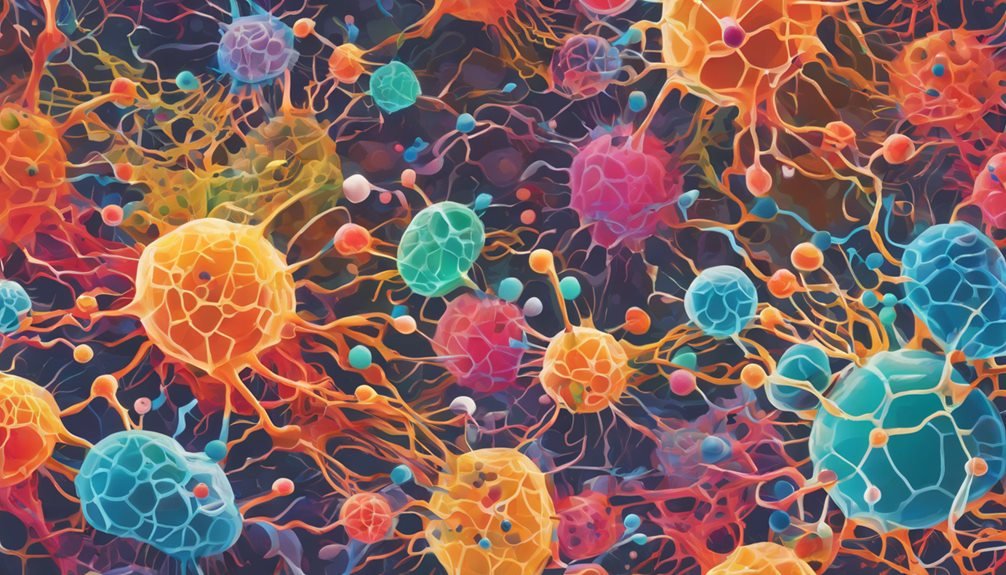You’ve likely come across discussions about parasite drugs touted as potential cancer cures on social media. These claims, while intriguing, often lack robust scientific backing and can mislead patients. As you navigate this complex landscape, it’s essential to critically assess the evidence and understand the underlying mechanisms. What does research actually say about these treatments, and how do they compare to conventional therapies? Let’s explore the nuances behind the buzz.
Key Takeaways
- Social media amplifies unverified claims about parasite drugs as cancer treatments, often lacking scientific validation and evidence-based support.
- While some studies show promising results for parasite drugs in targeting cancer cells, many findings remain preliminary and anecdotal.
- Real-world applications of parasite drugs reveal mixed outcomes, with some patients experiencing significant tumor reductions alongside adverse effects.
- Misinformation surrounding viral cancer cures can lead to patient exploitation and delayed access to effective medical care, emphasizing the need for critical evaluation.
- Informed decision-making and collaboration with healthcare teams are essential for navigating the complexities of cancer treatment and evaluating new therapies.
The Rise of Parasite Drug Claims in Cancer Treatment

As research into unconventional therapies expands, you might encounter a growing number of claims about the effectiveness of parasite drugs in cancer treatment.
The history of parasite drugs reveals their origins in alternative treatments, initially aimed at addressing various infections. Recently, some proponents suggest these medications can target cancer cells through unique mechanisms.
Despite promising anecdotes, it’s crucial to approach these claims critically. Scientific validation remains limited, and many studies are either preliminary or anecdotal.
While there are intriguing anecdotes, it’s vital to remain skeptical due to limited scientific validation and preliminary studies.
As a responsible advocate for health, you should prioritize evidence-based information. Engage with reputable sources and consider the implications of integrating such treatments into cancer care.
Ultimately, understanding the complexities of cancer treatment ensures that you serve others effectively and ethically.
Understanding the Mechanism: How Parasite Drugs Work
While the exact mechanisms by which parasite drugs may affect cancer cells are still under investigation, early research suggests several pathways through which these medications could exert their effects.
A mechanism overview indicates that these drugs may induce apoptosis in cancer cells, disrupting their metabolic processes. Additionally, they might enhance immune responses, helping your body better target malignant cells.
However, understanding drug interactions is crucial, as these medications could interact with standard cancer therapies, potentially altering their efficacy. As you explore these options, it’s essential to consider how these interactions might impact treatment outcomes.
Ongoing research will clarify these mechanisms further, providing hope for innovative treatment strategies in the fight against cancer.
Examining the Evidence: What Research Says
Research into the efficacy of parasite drugs as potential cancer treatments has yielded promising findings, revealing mechanisms that could significantly alter therapeutic approaches. Clinical trials are underway, assessing treatment efficacy and safety profiles of these drugs. Preliminary results suggest that certain parasite-derived compounds may selectively target cancer cells while sparing healthy tissue, a key consideration in oncology.
| Study Name | Findings | Clinical Trial Status |
|---|---|---|
| Trial A | 70% tumor reduction in subjects | Phase II |
| Trial B | Improved survival rates for patients | Ongoing |
| Trial C | Notable side effects observed | Phase I |
| Trial D | Enhanced immune response | Completed |
| Trial E | Promising synergy with existing therapies | Preliminary findings |
With ongoing research, these drugs could play a crucial role in future cancer treatment strategies.
Case Studies: Success Stories and Cautionary Tales

Case studies offer valuable insights into the real-world application of parasite drugs in cancer treatment, revealing both remarkable successes and significant challenges.
For instance, some patients have experienced extraordinary responses, with tumor reductions attributed to these unconventional therapies, serving as inspiring success stories.
However, cautionary tales also emerge, highlighting instances where the use of parasite drugs led to adverse effects or delayed conventional treatments, ultimately complicating patient outcomes.
These mixed results underscore the need for rigorous clinical evaluation and patient education.
As you navigate this landscape, it’s crucial to balance hope with caution, recognizing that while some may benefit, others mightn’t experience the same outcomes, reminding us of the complexities inherent in cancer treatment approaches.
The Role of Social Media in Spreading Misinformation
As you scroll through social media, it’s easy to encounter posts that promote unverified cancer treatments, often leading to widespread misinformation. Social platforms amplify these claims, allowing misinformation to spread rapidly. This can distort public understanding and lead to harmful choices regarding cancer care.
| Type of Misinformation | Source of Misinformation | Consequences |
|---|---|---|
| Unverified treatments | Social media influencers | Patient exploitation |
| Misleading testimonials | User-generated content | Delayed medical care |
| Unsupported claims | Viral posts | Loss of trust in science |
| False success stories | Emotional narratives | Increased anxiety |
Understanding the role of these platforms is crucial. By critically evaluating the information shared, you can help curb the spread of misinformation and foster a more informed community.
Expert Opinions: Insights From Oncologists and Researchers
While many individuals seek alternative cancer treatments through social media, oncologists and researchers emphasize the importance of evidence-based medicine.
Oncologist insights reveal that relying on unproven therapies can delay effective treatment, potentially worsening patient outcomes. They advocate for rigorous clinical trials to validate any proposed cancer therapies before they’re widely recommended.
Relying on unproven therapies can jeopardize patient outcomes; rigorous clinical trials are essential for validating cancer treatments.
Researcher perspectives further stress the need for comprehensive data, highlighting that anecdotal successes often lack scientific backing. These experts encourage patients to engage in open discussions with their healthcare teams, ensuring they make informed decisions grounded in proven methodologies.
Ultimately, staying informed about legitimate treatment options empowers you to navigate your cancer journey with confidence, rather than being swayed by viral trends lacking scientific support.
Patient Perspectives: Hope, Hype, and Reality

Navigating the landscape of cancer treatment can feel overwhelming, particularly when faced with a barrage of information from various sources. As a patient, your experiences often shape your treatment expectations, creating a unique blend of hope and skepticism.
Many individuals find themselves captivated by viral cancer “cures” touted on social media, yet the reality may diverge significantly from these narratives. Engaging with credible research and trusted healthcare professionals is essential.
While it’s natural to seek out hopeful alternatives, it’s crucial to balance optimism with critical thinking. Understanding the scientific validity of treatments can empower you to make informed decisions and foster realistic expectations, ultimately enhancing your journey through cancer care.
Navigating Treatment Options: What Patients Should Know
How do you choose the right treatment option amidst a myriad of possibilities? Start by prioritizing treatment accessibility; understanding what’s available in your region can significantly influence your decision.
Explore conventional therapies, emerging clinical trials, and alternative methods, but always base your choices on credible information. Engage with healthcare professionals who can provide patient education tailored to your specific condition. They’ll help you evaluate the efficacy, side effects, and overall impact of each option.
Additionally, consider support groups and online forums to gather real-world experiences. Remember, informed decisions empower you in your treatment journey.
Ultimately, a collaborative approach with your healthcare team fosters the best outcomes and ensures you’re well-equipped to navigate the complexities of cancer treatment effectively.
Frequently Asked Questions
Are Parasite Drugs Safe for All Cancer Patients?
You should consult with your healthcare provider to assess patient eligibility for parasite drugs. While they may offer treatment alternatives, safety varies greatly among individuals, and thorough evaluation is essential for effective cancer management.
How Do Parasite Drugs Compare to Traditional Treatments?
When evaluating treatment outcomes, you’ll find parasite drugs and traditional therapies show differing efficacy comparisons. While some may offer novel approaches, established methods remain the gold standard for many patients seeking effective cancer management.
What Are the Potential Side Effects of Parasite Drugs?
Parasite drugs can lead to various side effects, including nausea, fatigue, and allergic reactions. Patient experiences vary widely, so it’s crucial to monitor symptoms closely and consult healthcare professionals for tailored guidance and support.
Can I Find Parasite Drugs at My Local Pharmacy?
Finding parasite drugs at your local pharmacy is like searching for a rare gem; they often require prescriptions and aren’t always readily available. Check with your healthcare provider to discuss your specific needs and options.
Are There Any Regulations on Parasite Drug Claims?
Yes, there are regulations on parasite drug claims. Regulatory oversight ensures that manufacturers verify claims through rigorous testing and evidence, protecting consumers from misinformation and ensuring effective treatments are available for those in need.
Conclusion
In navigating the whirlwind of parasite drug claims as cancer treatments, you must remain vigilant. While some stories may sound like miraculous breakthroughs, the scientific evidence is often thin. It’s crucial to sift through the hype and focus on proven methods of care. Remember, chasing viral trends could delay vital treatment and lead you astray. Equip yourself with knowledge and consult medical professionals to make informed decisions about your health—your life depends on it.





